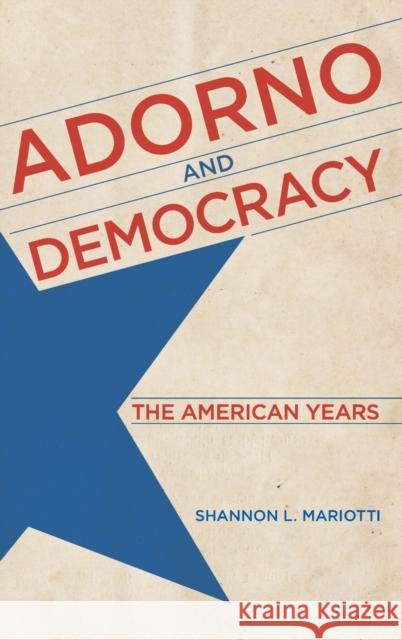Adorno and Democracy: The American Years » książka
Adorno and Democracy: The American Years
ISBN-13: 9780813167336 / Angielski / Twarda / 2016 / 234 str.
German philosopher and social critic Theodor Adorno (1903--1969) is widely regarded as one of the twentieth century's most influential thinkers. A leading member of the Frankfurt School, Adorno advanced an unconventional type of Marxist analysis in books such as Dialectic of Enlightenment (1944), Minima Moralia (1951), and Negative Dialectics (1966). Forced out of Nazi Germany because of his Jewish heritage, Adorno lived in exile in the United States for nearly fifteen years. In Adorno and Democracy, Shannon Mariotti explores how this extended visit prompted a concern for and commitment to democracy that shaped the rest of his work.Mariotti analyzes the extensive and undervalued works Adorno composed in English for an American audience and traces the development of his political theory during the World War II era. Her unique study examines how Adorno changed his writing style while in the United States in order to directly address the public, which lay at the heart of his theoretical concerns. Despite his apparent contempt for popular culture, his work during this period clearly engages with a broader public in ways that reflect a deep desire to understand the problems and possibilities of democracy as enacted through the customs and habits of Americans. Ultimately, Adorno advances a theory of democratic leadership that works through pedagogy to cultivate a more robust and meaningful practice of citizenship.Mariotti incisively demonstrates how Adorno's unconventional and challenging interpretations of US culture can add conceptual rigor to political theory and remind Americans of the normative promise of democracy. Adorno and Democracy is an innovative contribution to critical debates about contemporary US politics.
German philosopher and social critic Theodor Adorno (1903-1969) is widely regarded as one of the twentieth centurys most influential thinkers. A leading member of the Frankfurt School, Adorno advanced an unconventional type of Marxist analysis in books such as Dialectic of Enlightenment (1944), Minima Moralia (1951), and Negative Dialectics (1966). Forced out of Nazi Germany because of his Jewish heritage, Adorno lived in exile in the United States for nearly fifteen years. In Adorno and Democracy, Shannon Mariotti explores how this extended visit prompted a concern for and commitment to democracy that shaped the rest of his work.Mariotti analyzes the extensive and undervalued works Adorno composed in English for an American audience and traces the development of his political theory during the World War II era. Her unique study examines how Adorno changed his writing style while in the United States in order to directly address the public, which lay at the heart of his theoretical concerns. Despite his apparent contempt for popular culture, his work during this period clearly engages with a broader public in ways that reflect a deep desire to understand the problems and possibilities of democracy as enacted through the customs and habits of Americans. Ultimately, Adorno advances a theory of democratic leadership that works through pedagogy to cultivate a more robust and meaningful practice of citizenship.Mariotti incisively demonstrates how Adornos unconventional and challenging interpretations of US culture can add conceptual rigor to political theory and remind Americans of the normative promise of democracy. Adorno and Democracy is an innovative contribution to critical debates about contemporary US politics.











